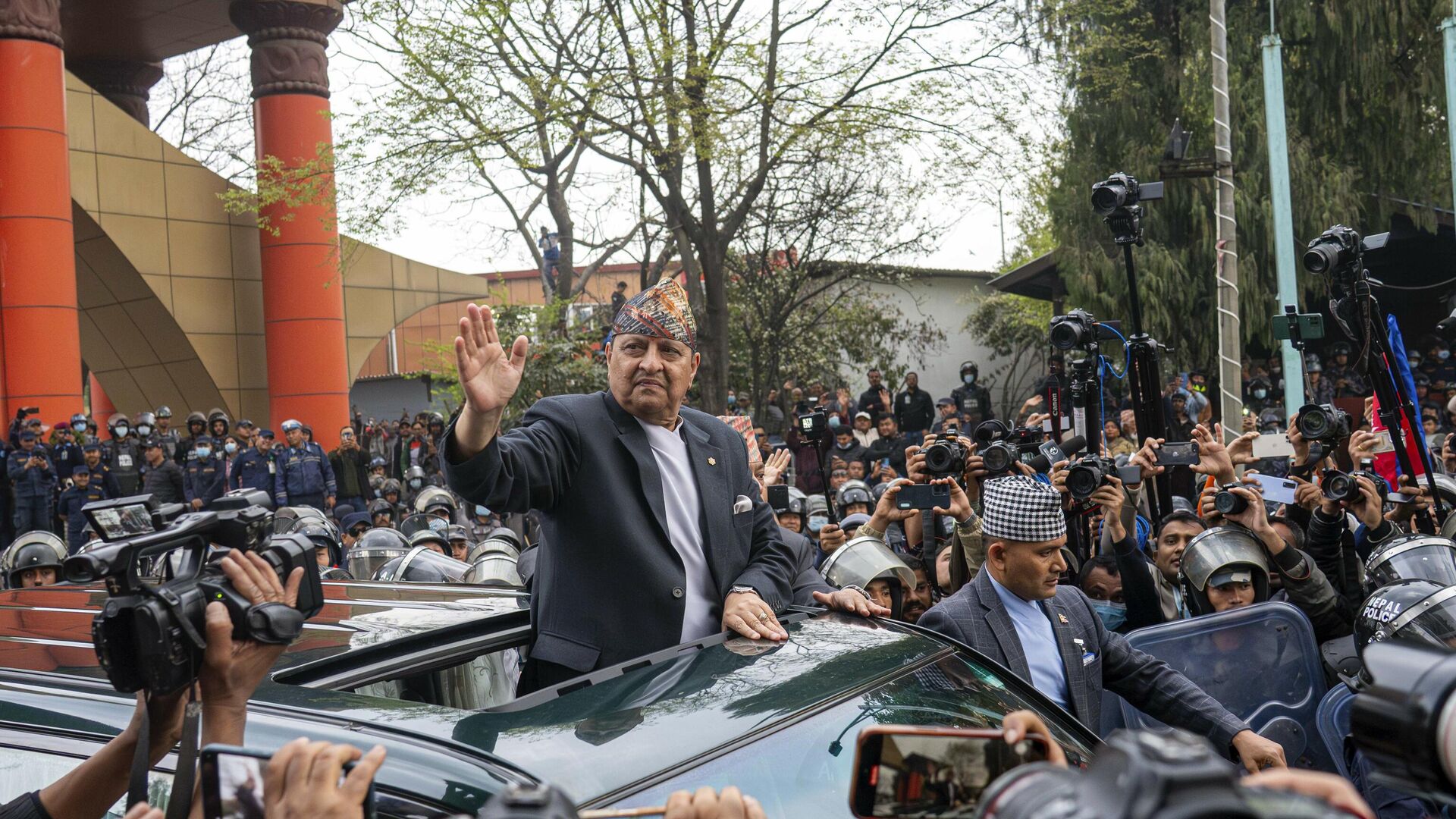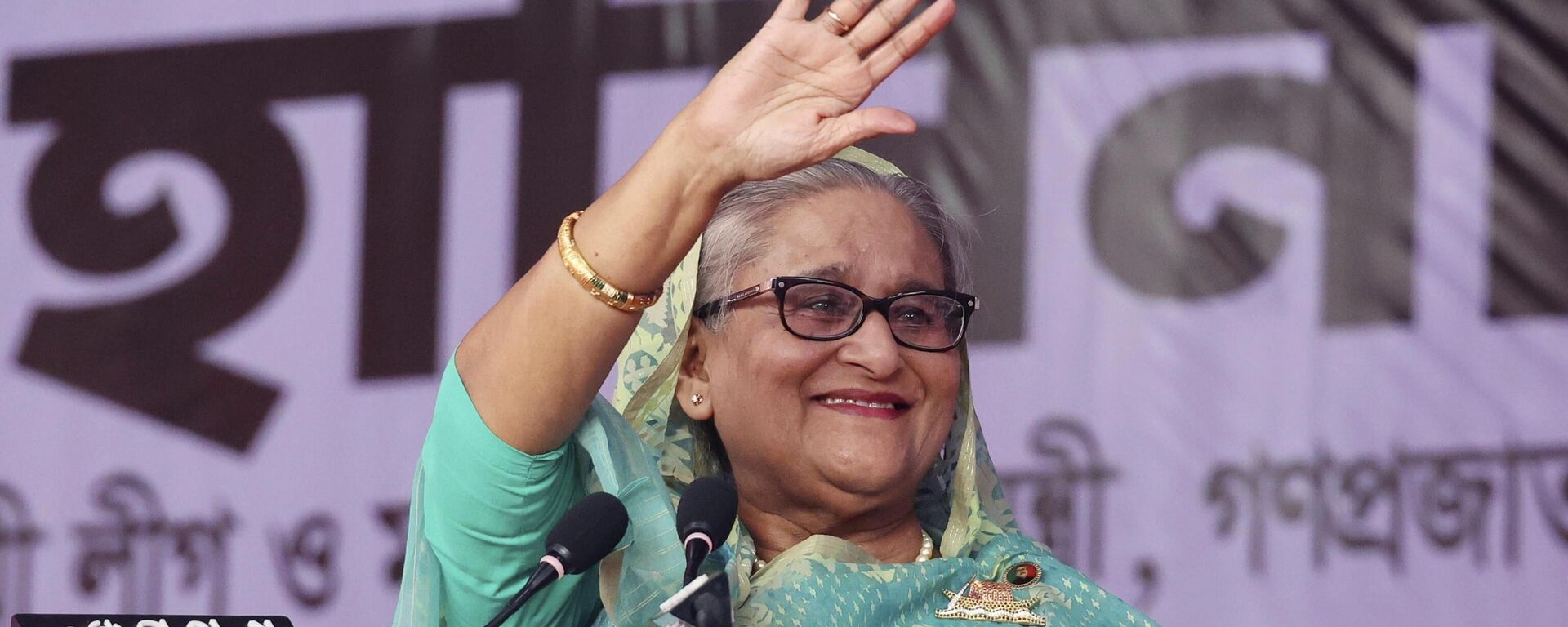https://sputniknews.in/20250326/fundamentalists-behind-pro-monarchy-protests-nepals-ruling-party-8907706.html
Fundamentalists Behind Pro-Monarchy Protests: Nepal's Ruling Party
Fundamentalists Behind Pro-Monarchy Protests: Nepal's Ruling Party
Sputnik India
A senior official from Nepal's ruling Communist Party (UML) told Sputnik India that there would be "consequences" against pro-monarchist protestors who are seeking to topple the government and demanding a comeback of monarchy.
2025-03-26T17:38+0530
2025-03-26T17:38+0530
2025-03-26T17:41+0530
world news
nepal
india
kathmandu
political controversy
political crisis
coup attempt
china
beijing
south asia
https://cdn1.img.sputniknews.in/img/07e9/03/1a/8908607_0:160:3072:1888_1920x0_80_0_0_6be87df5741efe9134d2765bf87c1f98.jpg
While no foreign power is directly involved in supporting the ongoing pro-monarchy protests in Nepal, there are fears in political circles that some "fundamentalists" could be behind these anti-government demonstrations, a senior official from the ruling Communist Party of Nepal (Unified Marxist–Leninist), or CPN (UML), told Sputnik India on Wednesday."Our expectation is that India, as the world's largest secular democratic republic, would back the aspirations of the Nepalese people and oppose these pro-monarchy protests," Rijal stated.Separately, a statement by CPN (UML) on Tuesday strongly condemned the "baseless and misleading" reports in sections of domestic and international media, which claimed that Prime Minister KP Sharma Oli has accused India of "conspiring to remove him from office".The party statement stressed that media reports claiming the Prime Minister called for King Gyanendra Shah's arrest are false and intended to tarnish Nepal's leadership, emphasising that these reports do not represent the views or position of PM Oli.The ruling party has said that it remained steadfast in promoting a "principled foreign policy", which was rooted in mutual respect, constructive dialogue and regional cooperation.These statements come amid a renewed round of political unrest in Nepal, where pro-royalists entities have been staging protests demanding reinstatement of the Hindu monarchy in the wake of former and the last monarch King Gyanendra Shah returning to Kathmandu on 9 March.The Himalayan country, which borders India and China, adopted a new constitution in 2015, replacing an older 2007 version. The Constitution came into being at the end of a long-drawn civil war under the former monarchy."There's no precedent of monarchy being restored in any country in the world. The former king is a billionaire businessman. He is enjoying his rights like any other citizen. There isn't any threat to his safety or liberty in Nepal," Rijal stated.He recalled that even though the monarchy has had a long tradition in Nepal, making it the only country to ever have had a Hindu monarchy, there wasn't any possibility that the royalists would make a comeback in the country.Rijal highlighted that not only had the ruling party and opposition coalesced around the republican setup in view of the threat from pro-monarchists, but also the Madhesi—people living in the Nepalese plains adjoining the Indian border—had opposed these protests.
https://sputniknews.in/20240418/bangladesh-nepal-call-for-revival-of-saarc-to-boost-south-asia-cooperation-7159916.html
nepal
india
kathmandu
china
beijing
south asia
Sputnik India
feedback.hindi@sputniknews.com
+74956456601
MIA „Rossiya Segodnya“
2025
Dhairya Maheshwari
https://cdn1.img.sputniknews.in/img/07e6/0c/13/138962_0:0:641:640_100x100_80_0_0_2cb44360dbcdf6d84bf4b299cd045917.jpg
Dhairya Maheshwari
https://cdn1.img.sputniknews.in/img/07e6/0c/13/138962_0:0:641:640_100x100_80_0_0_2cb44360dbcdf6d84bf4b299cd045917.jpg
News
en_IN
Sputnik India
feedback.hindi@sputniknews.com
+74956456601
MIA „Rossiya Segodnya“
Sputnik India
feedback.hindi@sputniknews.com
+74956456601
MIA „Rossiya Segodnya“
Dhairya Maheshwari
https://cdn1.img.sputniknews.in/img/07e6/0c/13/138962_0:0:641:640_100x100_80_0_0_2cb44360dbcdf6d84bf4b299cd045917.jpg
pro-monarchy protests, pro-monarchy protest in nepal, nepal hindus, nepal news, protests in nepal, kp sharma oli, kp sharma oli news, india nepal news
pro-monarchy protests, pro-monarchy protest in nepal, nepal hindus, nepal news, protests in nepal, kp sharma oli, kp sharma oli news, india nepal news
Fundamentalists Behind Pro-Monarchy Protests: Nepal's Ruling Party
17:38 26.03.2025 (Updated: 17:41 26.03.2025) A senior official from Nepal's ruling Communist Party (UML) told Sputnik India that there would be "consequences" for pro-monarchist protesters seeking to overthrow the government and reinstate former King Gyanendra Shah.
While no foreign power is directly involved in supporting the ongoing pro-monarchy protests in Nepal, there are fears in political circles that some "fundamentalists" could be behind these anti-government demonstrations, a senior official from the ruling Communist Party of Nepal (Unified Marxist–Leninist), or CPN (UML), told Sputnik India on Wednesday.
"There are fears in Nepal that some fundamentalists based in India could be trying to provoke these protests. Successive Indian governments have played a key role in facilitating peace talks in Nepal and getting to this stage, where we have a constitutional secular republic, on the lines of the political system which India has had since its Independence in 1947," Central Committee Member of the ruling CPN (UML) and the Deputy Chief of the Department of Foreign Affairs, Bishnu Rija, stated.
Sputnik India couldn't independently verify these allegations.
"Our expectation is that India, as the world's largest secular democratic republic, would back the aspirations of the Nepalese people and oppose these pro-monarchy protests," Rijal stated.
Separately, a statement by CPN (UML) on Tuesday strongly condemned the "baseless and misleading" reports in sections of domestic and international media, which claimed that Prime Minister KP Sharma Oli has accused India of "conspiring to remove him from office".
The party statement stressed that media reports claiming the Prime Minister called for King Gyanendra Shah's arrest are false and intended to tarnish Nepal's leadership, emphasising that these reports do not represent the views or position of PM Oli.
"The dissemination of such misinformation is a deliberate attempt to disrupt Nepal's internal harmony, sow discord in the region and create an unnecessary strain in Nepal's diplomatic relations, particularly with India- one of Nepal's closest and most valued neighbours," the release said.
The ruling party has said that it remained steadfast in
promoting a "principled foreign policy", which was rooted in mutual respect, constructive dialogue and regional cooperation.
These statements come amid a renewed round of political unrest in Nepal, where pro-royalists entities have been staging protests demanding reinstatement of the Hindu monarchy in the wake of former and the last monarch King Gyanendra Shah returning to Kathmandu on 9 March.
The Himalayan country, which borders India and China, adopted a new constitution in 2015, replacing an older 2007 version. The Constitution came into being at the end of a long-drawn civil war under the former monarchy.
Commenting on the pro-monarchy protests, Rijal underscored that the government remained resolute in safeguarding the "hard-earned political gains" that had been decades in the making.
"There's no precedent of
monarchy being restored in any country in the world. The former king is a billionaire businessman. He is enjoying his rights like any other citizen. There isn't any threat to his safety or liberty in Nepal," Rijal stated.
He recalled that even though the monarchy has had a long tradition in Nepal, making it the only country to ever have had a Hindu monarchy, there wasn't any possibility that the royalists would make a comeback in the country.
"It is impossible to reverse the process of adopting a constitutional republic. The monarchy can't make a comeback in Nepal," the Central Committee member stated.
Rijal highlighted that not only had the ruling party and opposition coalesced around the republican setup in view of the threat from pro-monarchists, but also the Madhesi—people living in the Nepalese plains adjoining the Indian border—had opposed these protests.



